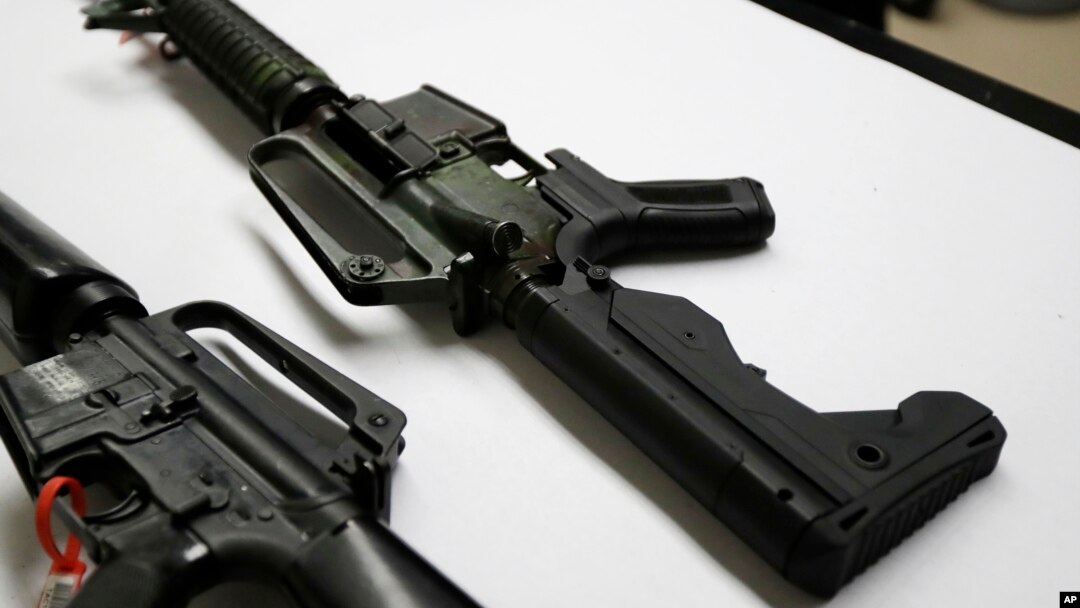U.S. President Donald Trump's administration moved forward Saturday with plans to place a ban on bump stocks, a device that enables guns to fire like automatic weapons. The device was used during last year's massacre in Las Vegas.
The Justice Department took the incremental step of formally submitting to the Office of Management and Budget a proposal to prohibit the sale of the devices.
"President Trump is absolutely committed to ensuring the safety and security of every American and he has directed us to propose a regulation addressing bump stocks,” Attorney General Jeff Sessions said in a statement. “To that end, the Department of Justice has submitted to the Office of Management and Budget a notice of a proposed regulation to clarify that the National Firearms and Gun Control Act defines ‘machine gun’ to include bump stock type devices.”
The law enforcement agency must complete a lengthy process before the proposed ban becomes reality. The move does not require congressional approval, permitting the administration to avoid pressure from the National Rifle Association and other pro-gun organizations.
Trump signed a memorandum last month directing the Justice Department to propose the regulatory change, which now must be approved by OMB before it is published for a period of public comment.

FILE - Photos and notes adorn a wall at the Las Vegas Community Healing Garden in Las Vegas, Oct. 16, 2017. The garden was built as a memorial for the victims of the mass shooting in Las Vegas. A bump stock was used in that shooting.
The NRA did not immediately comment on the administration's latest move but said previously it would await the publication of the proposed regulation before adopting a position.
On Friday, the NRA said it planned to sue the state of Florida for enacting gun control legislation that raises the minimum age to buy rifles from 18 to 21.
NRA lawyers are asking a federal judge to block the new age restriction, arguing that it violates the Second Amendment of the U.S. Constitution.
Florida Governor Rick Scott, a Republican long allied with the NRA, signed the legislation earlier Friday after the Republican-controlled statehouse narrowly approved the measure.
The NRA insisted that the measure “punishes law-abiding gun owners for the criminal acts of a deranged individual.”
In addition to the new age restriction, the Florida bill also adds a three-day waiting period to buy long guns, which was previously only for handguns. It also bans bump stocks, a device that allow guns to mimic fully automatic fire.
The law also creates a so-called "guardian" program that enables school staff to carry handguns if they wish to and if they complete law enforcement training.
The legislation comes three weeks after a shooter killed 17 people at Parkland, Florida’s Marjory Stoneman Douglas High School.
FILE - Students at Marjory Stoneman Douglas High School mourn in front of makeshift memorials for victims of a shooting at the school, in Parkland, Florida, Feb. 18, 2018.
"What I'm proud of in this state is that we reacted to a horrible situation,” Scott said after signing the bill Friday. He said the bill represents a compromise for people on both sides of the gun debate and balances “our individual rights with need for public safety.”
Student activists had campaigned for even tougher gun control restrictions, including a ban on assault-style weapons, which was not included in the final bill.
Authorities say the accused gunman, Nikolas Cruz, was 18 years old when he legally purchased the AR-15 assault-style rifle used in the massacre.
The NRA, which claims 5 million members, is one of the country's most powerful lobbying groups for gun rights. Founded in 1871, it seeks to educate the public about firearms and defend U.S. citizens' Second Amendment rights. It has directly lobbied for and against legislation since 1975.


